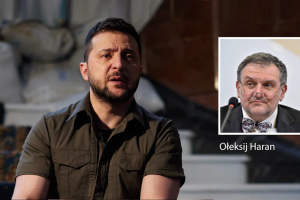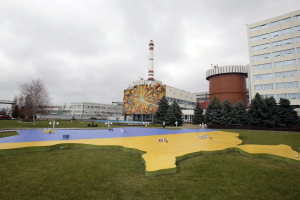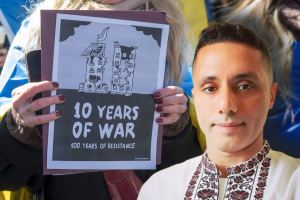Brief No.1
International Developments
On 14 December 2022, the European Investment Bank confirmed short- to long-term commitment of rebuilding Ukrainian infrastructure decimated by Russian purposeful attacks on civilian and critical infrastructure. EIB efforts contributed to bilateral initiatives of the Western partners of Ukraine within framework of “Energy Ramstein” summit (which took place on 13 December in Paris driven much by the efforts of French President Emmanuel Macron). It illustrates comprehensive Western approach to continuing support of Ukraine after Russian shift in tactics to implying terror attacks against civilian/critical infrastructure.
The EU and G7 initiative to introduce the $60 price cap on Russian oil and EU decision to limit natural gas price in the European markets will gradually ban access for the Russian energy to the global markets. It will come after severe cuts in investments to explore new and maintain operational oil&gas fields in the Siberia and Arctic. Meanwhile, Russia has still profited from the oil deliveries to EU (260m EUR a day in September). Russia will have enough money to finance invasion to Ukraine, since it sells its oil above critical level of $40 per crude barrel to the countries that did not join western sanctions. This is supported by the fact that between 2015-2020 Russia was able to conduct military operations in Syria and eastern Ukraine when the oil prices were close to $40.
On 16 December, EU approved the 9th package of economic and individual sanctions in response to Russia’s continuing war of aggression against Ukraine and the gravity of the current escalation against civilians and civilian infrastructure. The package focuses on export control and restrictions on dual-used goods and technologies targeting 168 additional entities; on Russian banking sector, broadcasting, consulting services, energy/mining sector and individual sanctioning. Approval of this package highlighted growing camp of supporters of the complete isolation of Russia. The Netherlands has openly joined Poland, and Baltic and Scandinavian countries, which take the toughest position on Russia.
War/Security Situation
On 5 and 15 December, Russian military conducted 8th and 9th cruise missile attacks on Ukrainian civilian critical infrastructure, specifically targeting energy grid when the outside temperature fell to sub-zero levels. Although Ukrainian anti-air defense capabilities has reached its 80% efficiency (due to modern Western defense systems), massive Russian missile strikes with barrages ranging from 70 to 90 missiles per strike day in several waves continue to pose a serious challenge to Ukrainian military, and a clear and present threat to civilians.
Additionally, Ukrainian authorities and military intelligence reported new evidence that Russia has reached an agreement with Iran on additional shipments of drones, used in the recent Russian attacks and a likely shipment of ballistic missiles.
The battlefield situation remains tense near the towns of Bakhmut and Avdiivka in the Donetsk region. Kremlin seeks to show at least some results for the domestic objectives: (1) to compensate for the loss of Kherson; (2) to mobilize Russian population authorizing full draft mobilization; and (3) to keep Ukrainian forces tied and drawing its resources from pressing Russian positions on the Southern front.
Meanwhile, in the first half of December, the Ukrainian Armed Forces continued to set stage for further counter-offensive operations by grinding Russian manpower and equipment and degrading their capabilities to reinforce.
Russia renewed its pressure on the self-proclaimed Belarussian president Lukashenka to make him join war effort in Ukraine. On 5 December, the Russian Defense Minister Shoygu visited Minsk to negotiate with his Belarus counterparts to sets a stage for wider political discussion between Lukashenka and President Putin, which was scheduled on 19 December. According to our tentative observations, Lukashenka agreed to join the war since Putin promised to keep low gas prices for Belarus and yield to Lukashenka’s calls to transfer some nuclear strike capabilities.
Recommendations
In addition to the timely delivery of the necessary weapons to Ukraine, the readiness of the West to provide Ukraine with resources and equipment for the restoration of power grids, substations, Thermal Power Plants/Hydro Power Plants will significantly reduce Russia's chances of success during the winter campaign of 2022/2023.
The slow impact of sanctions on the key sectors of Russian economy gives the Kremlin time to introduce necessary austerity and adjustment measures. Although the sanctions adopted by EU and G7 in December 2022 are important, they do not undermine, but rather accelerate the process transition of the Russian economy to the "war rails".
1. The Western nations should accelerate the provision of assistance to Ukraine for the development of an echeloned air defense system. It should include not only anti-aircraft missile and anti-aircraft artillery systems, but also means of combating drones (Gepard, C-RAM) and ballistic missiles (Patriot), as well as modern fighters/interceptors equipped with high-precision air-to-air missiles air.
2. Western countries should pay serious attention to Russia's efforts to involve Belarus in the war against Ukraine. The Kremlin considers such actions not only as a way to seize the initiative on the battlefield (by opening the Northern Front and re-attacking Kyiv), but also as increasing moral and psychological pressure on the Ukrainian military and civilian population, depleting Ukraine's resources and increasing the flow of refugees to the EU.
Accordingly, the West, together with Ukraine, should give a clear signal that Kyiv has the necessary forces and the political consent of its allies to deliver an effective pre-emptive strike as soon as such a threat from Belarusian-Russian forces becomes inevitable. This requires greater synchronization between Western powers in providing timely military assistance to Ukraine to support its operational and strategic capabilities aimed at disrupting any possible Russian plans for further escalation of the war.
____________________
This policy brief was prepared as part of a project “Russia-Ukraine Conflict: from Full-Scale War to Conflict Resolution and Post-War Reconstruction” implemented in cooperation with the Razumkov Centre with the support of the MATRA program of the Embassy of the Netherlands. The opinions expressed are those of the author(s) only and should not be considered as representative of the Embassy’s official position.








